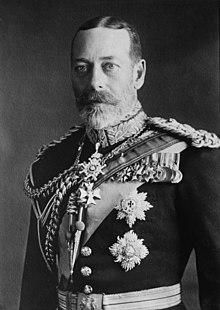

King of the United Kingdom
Prince George of Wales 3 June 1865 Marlborough House, Westminster, Middlesex
20 January 1936(1936-01-20) (70) Sandringham House, Norfolk, England
NamesGeorge Frederick Ernest Albert
King of the United Kingdom and the British Dominions and Emperor of India (1910–1936) For other uses, see George V (disambiguation). King of the United Kingdom George VGeorge V in 1923King of the United Kingdom and the British Dominions, Emperor of India (more ...) Reign6 May 1910 – 20 January 1936 Coronation22 June 1911Imperial Durbar 12 December 1911PredecessorEdward VIISuccessorEdward VIIIBornPrince George of Wales (1865-06-03 ) 3 June 1865 Marlborough House, Westminster, MiddlesexDied20 January 1936(1936-01-20) (aged 70) Sandringham House, Norfolk, EnglandBurial28 January 1936 St George's Chapel, Windsor CastleSpouseMary of Teck (m. 1893 )Issue Detail Edward VIIIGeorge VIMary, Princess RoyalPrince Henry, Duke of GloucesterPrince George, Duke of KentPrince JohnHouse Windsor (from 1917) Saxe-Coburg and Gotha (until 1917) FatherEdward VIIMotherAlexandra of DenmarkSignatureMilitary careerService Royal NavyYears of service1877–1892 (active service)RankSee listCommands held Torpedo Boat 79 HMS Thrush HMS Melampus George V (George Frederick Ernest Albert; 3 June 1865 – 20 January 1936) was King of the United Kingdom and the British Dominions, and Emperor of India, from 6 May 1910 until his death in 1936. Born during the reign of his grandmother Queen Victoria, George was third in the line of succession behind his father, Prince Albert Edward, and his own elder brother, Prince Albert Victor. From 1877 to 1892, George served in the Royal Navy, until the unexpected death of his elder brother in early 1892 put him directly in line for the throne. On Victoria's death in 1901, George's father ascended the throne as Edward VII, and George was created Prince of Wales. He became king-emperor on his father's death in 1910. George's reign saw the rise of socialism, communism, fascism, Irish republicanism, and the Indian independence movement; all of which radically changed the political landscape of the British Empire. The Parliament Act 1911 established the supremacy of the elected British House of Commons over the unelected House of Lords. As a result of the First World War (1914–1918), the empires of his first cousins Nicholas II of Russia and Wilhelm II of Germany fell, while the British Empire expanded to its greatest effective extent. In 1917, he became the first monarch of the House of Windsor, which he renamed from the House of Saxe-Coburg and Gotha as a result of anti-German public sentiment. In 1924, George appointed the first Labour ministry and the 1931 Statute of Westminster recognised the Empire's dominions as separate, independent states within the British Commonwealth of Nations. He had smoking-related health problems throughout much of his later reign and at his death was succeeded by his eldest son, Edward VIII.

We use cookies
We use cookies and other tracking technologies to improve your browsing experience on our website, to show you personalized content and targeted ads, to analyze our website traffic, and to understand where our visitors are coming from. Privacy Policy.